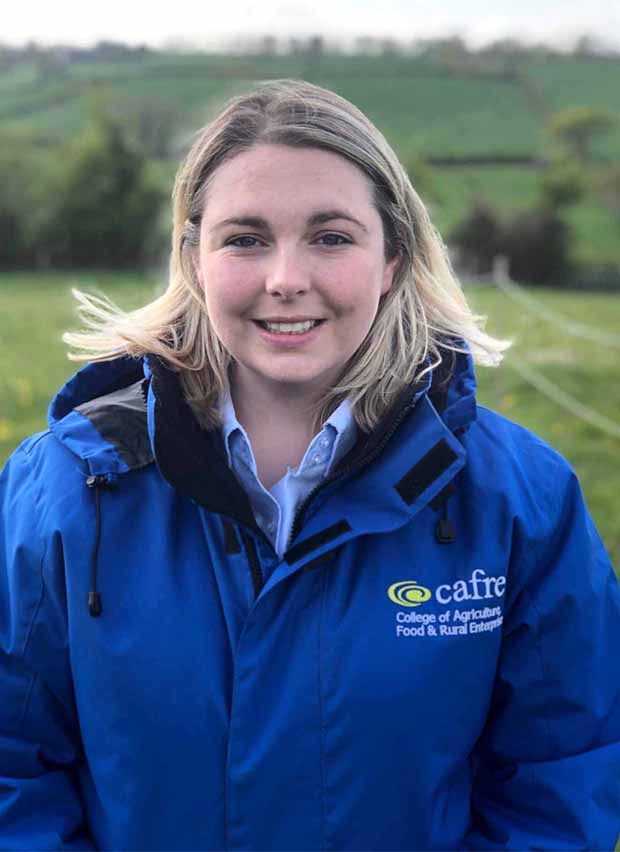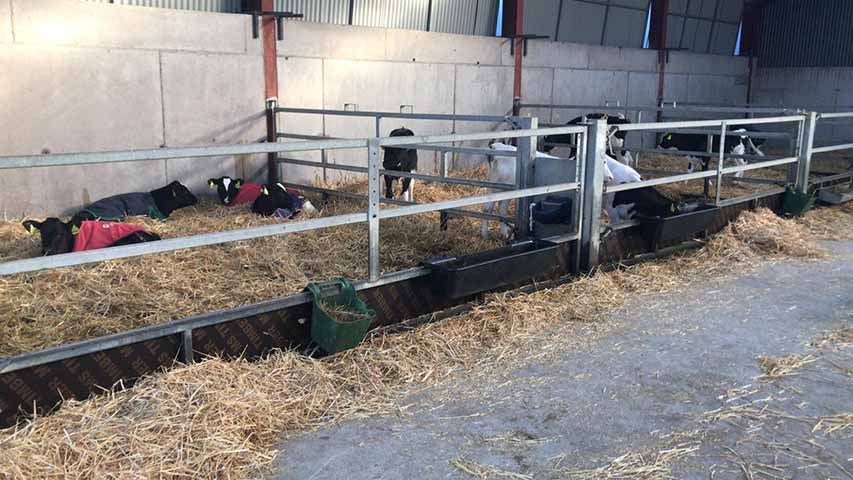Beech Park Farm is a family farm making progress with the CAFRE business development group
- An article by Judith McCord, Dairying Adviser, CAFRE for the Downpatrick area.
Beech Park Farm, located close to the village of Crossgar in County Down, is home to the Hogg family dairy farm. Together the partnership of Alan, Linda and son Tom manage the Holstein dairy herd plus all replacement stock.
The farm has 110 acres available for the dairy cows and young-stock to graze. The Hogg’s clear goal is to efficiently maximise production from grazed grass whilst having a healthy and happy lifestyle balance.
Top quality grazing and grass is a key priority on the farm with 3,400 litres produced from forage, and the average purchased feed for the herd is at 2.3t/cow giving an overall feed efficiency of 0.27kg/l.
The College of Agriculture, Food and Rural Enterprise (CAFRE) Business Development Group has been instrumental in the development of the business from the scheme began in 2015.

The Business Development Group (BDG) meetings provide an opportunity for farmers to connect with CAFRE dairying advisers to explore developments for their farm with the aim of improving technical efficiency and profitability of their farm business.
Tom said: “The local discussion group has provided us the opportunity to improve our dairy business based on the experiences of other farmers. This group approach builds on the knowledge within the group and is proven to be an effective method of increasing farm profitability.”
The Hogg’s have found it beneficial in terms of access to information, research and also the opportunity to visit other dairy producers.
On the Hogg farm, there is no need for fancy systems, just a simple system that is efficient and profitable. Cows are milked through a 12 point swing over parlour with ACRs. Tom manually sets up feed allocation to help target concentrate feeding.
Whilst being in the BDGs, both Alan and Tom have seen computerised Feed to Yield as a beneficial technology adoption and at some stage in the future, it will be included in the system.
Grassland Management
Cows are grazed as early as possible, with on/off grazing at the start of the season. Land around Beech Park Farm can be heavy and so prevention of poaching is important. Cows will go out full-time from mid/late April and grass measuring takes place on the farm throughout the season.
Through key discussion points on grazing techniques, soil performance and grass quality within the Hogg’s BDG, they have been able to improve the grazing infrastructure to allow for an extended grazing timeframe, effectively giving the herd more days at grass.
Improved Fertility
Over this past few years, the goal has been a compact calving pattern. The results of this are now filtering into the system with higher submission rates to first service and a better workload pattern for everyone involved in the farm.
All heifers and the top third of cows are AI bred to sexed semen with Aberdeen Angus semen used on the middle third and a beef bull used to sweep up the lower third.
Previous to this, stock bulls had been used extensively but the Hogg’s have moved away from this and have developed a more strategic breeding plan to deliver genetic gain in the herd.

Improved Animal Health
When cows are due to dry off, a separate batch is set up and cows are housed for 60 days before calving. Dry cows are fed 1.5kg dry cow blend through a TMR, with high fibre forage and free access to lick blocks. Freshly calved cows and heifers are introduced back into the herd 24 hours after calving down, unless there are any specific issues.
Getting the dry cow transition right is something that the Hogg family understand is essential to having a healthy milk cow and calf down the line. Colostrum management on farm is key with calves receiving colostrum by teat in the first 6 hours and the majority being tested and the excess frozen. For the first 3 days, calves are in individual pens and receive dam’s milk then move into pens of four and fed powered milk for 6-8 weeks.
This attention to detail is where Linda excels in producing strong healthy calves as replacements for the herd.
Since Tom came home from his travels in New Zealand, he is devoted to continuing to increase efficiency and profitability on the farm. One important farm development area is trying to reduce antibiotic usage in the herd.
Alan and Tom use milk recording information which highlights cows with potential problems. A recent BDG meeting highlighted just how beneficial this information can be in terms of milk urea levels, milk components and it has also helped streamline the ability to start selective dry cow therapy and consequently breeding for herd genetic improvement.
At the beginning of December, the herd are averaging 26 litres with a 4.47% fat and 3.5% protein. Going forward, the Hogg family’s attention to detail along with constructive discussions and feedback from their BDG will continue to deliver improvements for the business.
The BDG scheme is funded by the Department of Agriculture, Environment and Rural Affairs and the European Agriculture Fund for Rural Development.

























